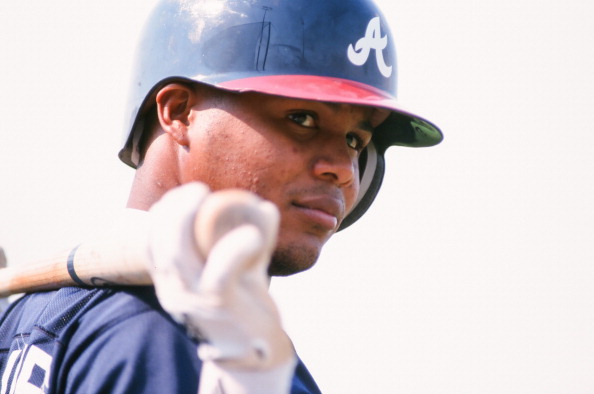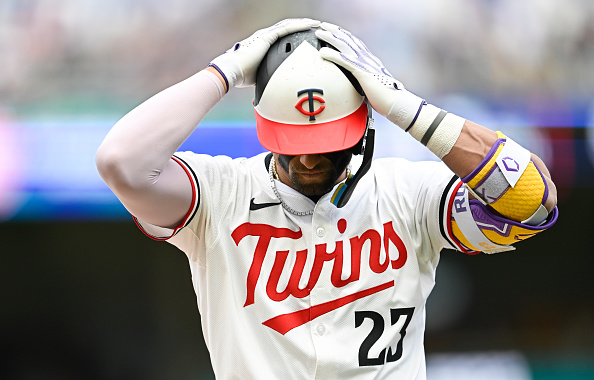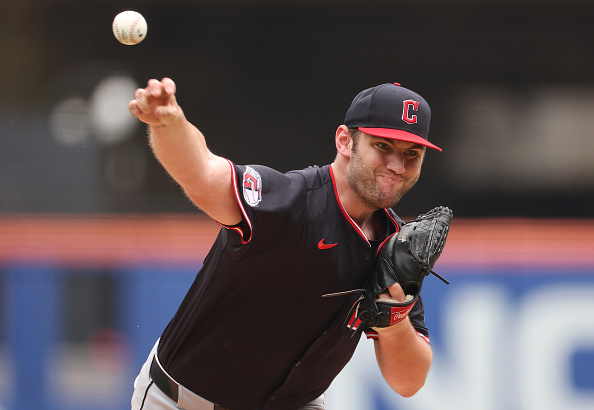Andruw Jones is on the MLB Hall of Fame ballot for the fourth time after receiving a big boost last season. Will the outfielder continue to get a boost with each year of eligibility? Will he wind up eventually being inducted into Cooperstown?
Make sure to check out all of our other MLB Hall of Fame Cases.
Jones was known mostly for his glove during his 17 seasons in baseball, his first 12 coming with the Atlanta Braves. However, his bat was nothing to scoff at, as his advanced metrics at the dish were very good from early on in his career. Jones was the best defensive center fielder of his generation, and perhaps even of all time.
Career Summary
Andruw Rudolf Jones was signed by the Atlanta Braves at the age of 16 in 1993. He made his Major League debut in August 1996 at 19 years old. Jones would play in 31 games that season and was still rookie eligible the following season in 1997. He immediately became a fan favorite for the Braves faithful in the 1996 World Series, when he became the youngest player ever to hit a home run in the postseason. In fact, Jones hit a homer in each of his first two World Series at-bats.
The outfielder would finish fifth in National League Rookie of the Year voting in 1997 after putting up 18 home runs and 70 runs batted in while scoring 60 runs. His numbers would only get better from there.
Jones won his first of 10 career Gold Gloves in 1998 and the offensive production rose as well. He made his first All-Star Game in 2000 after hitting .303 with 36 homers and 104 RBI. He went on to hit over 30 homers in each of the next three seasons (and 29 more bombs in 2004). Jones was named an All-Star in four more seasons – 2002, 2003, 2005, and 2006. In 2005, he led the National League with 51 home runs and 128 RBI, finishing as runner-up to Albert Pujols for NL MVP honors. Jones became one of the youngest players to the 300-homer mark during his career with the Braves.
Following the 2007 season, the native of Willemstad, Curaçao signed with the Los Angeles Dodgers. He struggled with the team and was released one year into his two-year contract. Jones finished his career with brief stints as a member of the Texas Rangers, Chicago White Sox, and New York Yankees. He transitioned to a designated hitter and fourth-outfielder role, and hit his 400th-career home run while with the White Sox.
Pros
During his last 10 seasons with the Braves from 1998 to 2007, Jones had his best stretch as a deadly force at the plate and in the field. He hit 345 home runs and had 1,034 RBI, an average of 34/103 per season. His 10-career Gold Glove awards put him with the likes of Hall of Famers Roberto Clemente, Willie Mays, Ken Griffey Jr., Al Kaline, and future Hall of Famer Ichiro Suzuki as the only outfielders with double-digit Gold Gloves.
Ralph Kiner only played 10 seasons but earned his place in the Hall, so let’s compare his career statistics to the best stretch of Jones’ lengthier career.
| Andruw Jones | Ralph Kiner | |
| Plate Appearances | 6,696 | 6,256 |
| Doubles | 305 | 216 |
| Home Runs | 345 | 369 |
| Runs | 974 | 971 |
| Runs Batted In | 1,034 | 1,015 |
| Slash Line | .266/.343/.503 | .279/.398/.548 |
| OPS+ | 115 | 149 |
| rWar/fWar | 57.6/60.5 | 47.9/47.6 |
Kiner wound up being inducted into the Hall in his final year of eligibility in 1975. The same fate may also await Jones.
Cons
That 10-year stretch was excellent and on its own could be deserving of Cooperstown, but Jones faded quickly at the end of his career. As good of a stretch as it was, he only had one instance in which he led the league in a major offensive category (51 homers, 2005).
Over his final five years between four different teams, Jones slashed just .210/.316/.424 and averaged a mere 13 home runs and 34 RBI. He also averaged only 87 games per season and struck out 25.5 percent of the time.
Jones never reached the magic 500 home run pinnacle, a benchmark that Hall of Fame voters often look for.
Verdict
Ultimately, the case for Jones boils down to longevity versus peak. At his peak, the phenom was a consistent bat and magnificent glove with championship-caliber Braves teams. His defense in the outfield was unmatched, which often managed to outweigh a powerful bat. During the years his bat caught up to his fielding, he still was never one of the top hitters in the league. That said, the glove on its own was good enough for Cooperstown and he did enough during his peak with the lumber to be considered.
For Jones, it will be an uphill battle, as he barely stayed on the ballot his first couple of years. He should continue to get more push, especially as the well known steroid-era players either get voted in or fall by the wayside. Last year, he received 19.7 percent of the vote after not getting more than 7.5 percent his first two opportunities.
Check us out on our socials:
Twitter: @PTSTNews and @TalkPrimeTime
Facebook Page: Prime Time Sports Talk
Join our Facebook Group: Prime Time Sports Talk
Instagram: @ptsportstalk
Follow Alex Kielar on Twitter @AlexKielar
Main Image Credit:
Embed from Getty Images








4 Responses
why not Andrew Jones in the hall or fame now